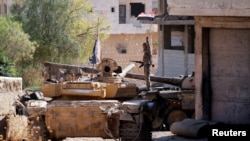Despite a fragile ceasefire that was announced unilaterally by the Syrian government troops last week, the situation in the northwestern Syrian province of Idlib remains uncertain as extremist militants, including foreign fighters, seem determined to carry on their fight against the Syrian regime.
Since April, Idlib has been the target of a military campaign by the Syrian regime and allied Russian forces as Syrian President Bashar al-Assad’s forces seek to retake control of the area, which is considered the last major rebel stronghold in Syria.
But Russia declared last week that Syrian troops have halted their operations to “stabilize the situation” in Idlib.
On Sunday, however, Syrian state media reported that clashes broke out between regime troops and jihadist forces in the southern countryside of Idlib.
According to the latest U.N. count, at least 1,000 civilians have been killed in Idlib since April.
Unimplemented deal
The northwestern Syrian province, home to nearly 3 million people, has been a center of contention between Russia and Turkey, two powers that support opposite sides of the Syrian conflict.
In September 2018, Moscow and Ankara reached an agreement that postponed a planned Syrian regime offensive on Idlib and other areas near the Turkish border.
As part of that agreement, Turkey was required to remove all extremist groups from the province, some of which are allied with al-Qaida terror group.
But one year into the deal, Turkey has allegedly failed to implement that part of its commitment with Russia as most of Idlib is still under the control of a former al-Qaida affiliate called Hayat Tahrir al-Sham (HTS), which was formerly known as the al-Nusra Front.
Threat to Turkey
The Russia-Turkey agreement “was born as an absolutely ‘dead deal’ since the conditions in it are just unrealizable,” said Kerim Has, a Moscow-based Turkish analyst. “Turkey has taken a responsibility on itself that could not be achieved, and time has just proven that.”
He told VOA that Idlib-based Islamist extremist groups already have become a direct threat to Turkey’s security.
“Turkey is not ready to prevent the threat of either foreign fighters or other radical groups,” Has said.
And while some foreign jihadists have left Syria via Turkey to countries like Libya and Afghanistan, “most of them will definitely infiltrate Turkish soil. I do not think that Turkish authorities are well aware of these threats to Turkey,” he added.
Turkey’s border areas with Idlib in recent years have witnessed several terror attacks blamed on Idlib-based extremist groups. Most recently, a car bomb in July killed at least three people and wounded many others in the border Turkish town of Reyhanli, which is located close to Idlib.
Thousands of Foreign Fighters
Experts estimate that thousands of foreign fighters from other terror groups also have a significant presence in Idlib, where they have managed attacks against their opponents.
“In the total numbers, we definitely go into the thousands. There are IS fighters who fled from eastern Syria into Idlib, including those who defected from the movement,” Aymenn Jawad al-Tamimi, a Syria researcher, told VOA.
Sadradeen Kinno, a Syrian researcher who closely follows militant groups in the country, says there are different types of foreign jihadists in Idlib.
“Some of them have established their own communities there like the Turkistan Islamic Party, al-Ansar al-Deen, Hurras al-Deen and Ansar al-Islam,” he said.
“These groups that still have ties with al-Qaida and that can’t go anywhere else, so they have decided to stay in Idlib and, in many instances, fight together against [Syrian] regime troops,” Kinno told VOA.
He said that these radical Islamists will likely continue their fight in Idlib because “they have nothing to lose.”
Analyst al-Tamimi has a similar assessment.
“They will either have to fight until the end, pretty much like what happened with IS in eastern Syria, or somehow flee to Turkey,” he noted.
U.S. Stance
U.S. officials also have voiced concerns about the presence of tens of thousands of foreign fighters in Idlib.
“Idlib is essentially the largest collection of al-Qaida affiliates in the world right now,” Michael Mulroy, deputy assistant secretary of defense for the Middle East, said during recent remarks at the Center for a New American Security in Washington.
Last week, the U.S. carried on an airstrike against an al-Qaida-held facility in Idlib.
“U.S. Forces conducted a strike against al-Qaida in Syria (AQ-S) leadership at a facility north of Idlib,” U.S. Central Command said in a statement.
“This operation targeted AQ-S leaders responsible for attacks threatening U.S. citizens, our partners, and innocent civilians,” it said.
“Northwest Syria remains a safe haven where AQ-S leaders actively coordinate terrorist activities throughout the region and in the West,” U.S. CENTCOM added.
Experts believe such strikes would likely continue as the U.S. considers combatting al-Qaida a part of its war on terror strategy in Syria.
“The U.S. will continue targeting al-Qaida leaders [in Idlib] because it’s part of its counterterrorism policy and clearly they’re doing it with Turkish consent,” analyst al-Tamimi said.




